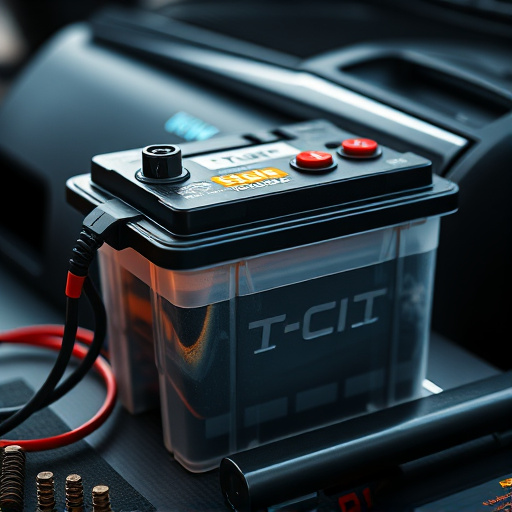Regularly checking your car battery's age, performance, and voltage (12.6-12.8 volts when off) is vital for safety and reliability. Batteries typically last 3-5 years but can degrade faster due to climate, habits, and maintenance. Signs of replacement include longer starting times, flickering lights, poor electric accessory function, or difficulty in cold weather. Proactive monitoring through voltage tests helps prevent breakdowns and saves costs on roadside assistance.
Is your car’s battery failing? Knowing the signs of a worn-out battery can save you from unexpected breakdowns. Here are 5 crucial tips to help you decide if it’s time for a replacement. From observing age and performance changes, checking for corrosion and leaks, assessing starting ability, to noticing other warning signs like an illuminated check engine light or dim headlights, these indicators will guide you in making an informed decision about replacing your car battery.
- Check Battery Age and Performance
- – How old is your battery?
- – Observing performance changes
- – Testing voltage levels
Check Battery Age and Performance

One of the most effective ways to determine if your car battery needs a replacement is by regularly checking its age and overall performance. Car batteries typically have a lifespan ranging from 3 to 5 years, depending on various factors like climate, usage patterns, and quality. As a rule of thumb, if your battery is around this age, it’s wise to have its health and performance checked.
During regular maintenance, observe the battery’s ability to hold a charge. If you find that your car struggles to start or shows signs of poor cranking, these could be indicators that the battery is weakening. Additionally, check for any leaks, corrosion, or damage on the battery terminals, as these issues can impact its functionality and efficiency. If left unattended, an old or malfunctioning battery may leave you stranded, so staying proactive with replacements ensures a reliable and safe driving experience.
– How old is your battery?

The age of your car battery can be a strong indicator of its health and longevity. Most car batteries typically last between 3 to 5 years, but this can vary greatly depending on factors like driving habits, climate, and overall vehicle maintenance. As batteries age, they gradually lose their ability to hold a charge, which means you might need to replace your car battery long before the end of its expected lifespan if it’s not well-maintained.
Regularly checking your battery’s age is crucial when considering a replacement. Look for signs like corrosion on the terminals or a leaking fluid, both of which could indicate internal damage. Additionally, keep an eye out for dim headlights or difficulty in starting the engine, as these are common symptoms of a declining battery performance. If you notice any such issues, it might be time to consider replacing your car battery to ensure smooth and reliable operation.
– Observing performance changes

If your car’s battery is holding less charge over time, it could be a sign that it’s on its last legs and needs replacement. Performance changes are often one of the first noticeable indicators. You might find that the starting process takes longer, with lights flickering or the engine struggling to turn over. This can happen because a weak battery struggles to deliver the required power to start your vehicle, especially in colder temperatures.
Additionally, if you’ve noticed frequent issues with electric accessories like headlights, radio, or heating systems not functioning optimally, it’s worth checking the battery’s health. A declining battery might not be able to maintain its output for extended periods, leading to these intermittent performance problems. Regularly observing your car’s performance can help you decide when it’s time to consider a replacement car battery to ensure your vehicle remains reliable.
– Testing voltage levels

One effective way to determine if your car battery needs replacement is by testing its voltage levels. A healthy car battery typically maintains a voltage between 12.6 and 12.8 volts when the engine is off and all accessories are disconnected. Using a voltmeter, you can measure this static voltage. If the reading consistently falls below 12.6 volts, it’s a strong indicator that the battery is not holding its charge effectively, and replacement may be necessary.
Regular voltage testing, especially if you notice dim lights or struggling engine starts, can help prevent unexpected breakdowns. Additionally, keeping track of these tests allows you to set a schedule for battery maintenance or replacement, ensuring your vehicle’s reliability on the road. Remember, a well-maintained car battery is key to avoiding inconvenient and costly roadside assistance calls, so it pays to stay proactive with regular checks.
If your car’s battery age is beyond its recommended lifespan, exhibits performance issues, or has low voltage readings, it might be time to consider a replacement. Regularly monitoring these indicators can help you stay ahead of potential breakdowns and ensure your vehicle starts reliably. Remember, a well-maintained battery is key to keeping your car running smoothly, so don’t hesitate to invest in a new one when necessary for a hassle-free driving experience.
